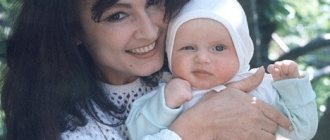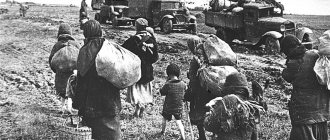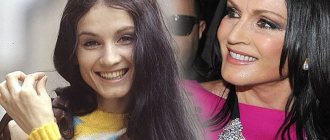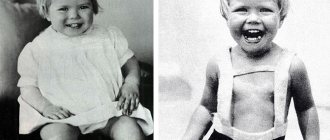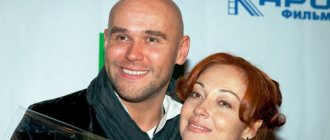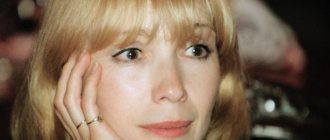Biography of Sofia Rotaru
Sofia Mikhailovna Rotaru is a Soviet, Russian, Ukrainian and Moldavian pop legend. Actress. Her repertoire includes more than five hundred compositions in twelve languages. People's Artist of the Soviet Union, winner of many other titles, regalia and awards, including the Order of St. Nicholas the Wonderworker “For the increase of good on Earth” and the Order of Friendship of Peoples. Hero of Ukraine and recipient of the Order of the Power, multiple winner of the Golden Gramophone award. Muse of Andrei Voznesensky, who dedicated the poem “The Voice” to the singer.
In the photo: Sofia Rotaru
Of course, it is difficult to contain all the facets of talent and all the vicissitudes of the difficult life of a great artist. In this biography, we tried to list the most significant moments in the life of Sofia Rotaru.
Solo career
In 1986, the Chervona Ruta ensemble broke up; the group decided to continue their career without Sofia Rotaru, returning to the old role of folk song. For the singer, this came as a surprise and caused difficult experiences. Rotaru begins to look for himself again, changes the direction of his creativity. This is largely due to the name of composer Vladimir Matetsky, who over the next 15 years created rock and Europop compositions for her, which quickly became popular.
In 1986, the singer performed the hit song “Luna Moon”, a year later - “It Was, But It’s Gone”, a year later - “Only This Is Not Enough”, which also forever entered the golden fund of the Soviet stage. In the mid-80s, the artist continued her active touring activities. All this made her the number one singer on the Soviet stage, the crown of which was her awarding the title of People's Artist of the USSR in 1988.
The end of the eighties was spent in close collaboration with the dance group “Todes”, which established itself largely due to its performances at all the artist’s concerts. The creative union of the artist and the ballet lasted for five years.
Sofia Rotaru
In 1991, on the wave of the popularity of hard rock, perhaps the singer’s heaviest album, “Caravan of Love,” was released. At the same time, the premiere of the musical film of the same name took place. In the same year, Rotaru celebrated 20 years of creative activity at the Rossiya State Conservatory. The concert featured innovative special effects for that time - laser graphics and unusual moving scenery.
After the collapse of the Union, the artist by no means lost her popularity. In the first years after the great and mighty passed away, she released several collections of her best songs. Despite her age, the singer not only does not lose her position, but also surprisingly remains on the wave of popularity even among young people.
In 1997, she participated in the film “10 Songs about Moscow,” where she performed the composition “Moscow Mayska” together with Ivanushki International, which was at the peak of its popularity. A year later, the performer’s first official disc, “Love Me,” was released, and then a concert program took place under the same name in the Kremlin Palace. In the same 1998, Rotaru was awarded the Order of St. Nicholas the Wonderworker “For increasing goodness on Earth.”
At the turn of the 2000s, Rotaru became the owner of a number of different titles. She is recognized as “Woman of the Year”, “Man of the 20th Century” and the best Ukrainian pop singer of the twentieth century. She receives the title of “golden voice” of Ukraine. In 2002, she was awarded the highest title - Hero of Ukraine. In general, that year became a landmark year for the singer, both with a plus and a minus sign.
Rotaru’s popularity reached its peak; with the song “My Life, My Love” she opened “Blue Light” on Channel One. At the same time, a new successful album, “I Still Love You,” was released. However, in October, a misfortune happened in her family - her husband Rotaru died of a stroke in a Kyiv clinic. After this, the singer canceled all tours and performances and missed the final concert of the Song of the Year festival for the only time in almost 30 years.
In 2003, Rotaru got a personalized star on the Walk of Celebrities in front of the Rossiya Concert Hall. In 2004 and 2005, new albums “The Sky is Me” and “I Loved Him” were released. In 2007, Rotaru celebrated its 60th anniversary. A grandiose concert took place in Yalta, and President Yushchenko awarded Sofia Mikhailovna the Order of Merit, II degree.
Rotaru was noted not only for solo performances, but also for successful duets with Nikolai Rastorguev and Nikolai Baskov. In 1998, Rotaru sang the song “Zasentyabrilo” with the lead singer of the group “Lyube”, and in 2005 and 2012. - with the “golden voice of Russia” songs “Raspberry Blossoms” and “I will find my love.” In 2011, Rotaru performed at a concert in Chechnya dedicated to the 35th anniversary of the head of the republic Ramzan Kadyrov and the opening of the Grozny City complex.
Childhood: Marshyntsi – Chernivtsi
In 1946, shortly after the end of the Great Patriotic War, the wounded machine gunner Mikhail Rotar, who had finished fighting in Berlin, returned to his native Ukrainian village of Marshintsy, Novoselitsky district, where his wife Alexandra was faithfully waiting for him with her typhoid and blind daughter Zina. This is the couple’s second child – the firstborn did not survive.
Parents of Sofia Rotaru
Until 1940, the village of Marshintsi was part of Romania. The singer's surname also has Romanian roots. Translated into Russian, “Rotar” means “wheel driver.”
In his native village, Mikhail held the position of foreman of winegrowers. In the summer of 1947, another girl was born into the family; she was named Sofiyka. In the post-war period, there was no special order in passport documentation, and the baby, who was actually born on August 7, was registered on the ninth day of birth.
Sofia Rotaru in childhood (pictured on the right)
From an early age, Sonechka was her mother’s main assistant, who woke up her daughter in the dark: She had to milk the cow, feed the chickens and the rest of the livestock, and then go to the market with vegetables to get a better place. There was always a queue near Alexandra and Sofiyka, their counter was so clean and tidy. The growing brothers Evgeny and Anatoly and sisters Lydia and Aurika soon also joined their sister and started doing housework early in the morning.
Rotaru sisters: Aurika, Sofia, Lydia
In the family, due to the prevailing ethnic circumstances, everyone spoke Moldovan. But the older sister, who, due to loss of vision, developed an absolute ear for music, listened to the radio, easily memorized songs and learned Russian on her own. Soon, thanks to Zinaida, the younger children also knew him.
Sofia Rotaru with her sister Zina (center)
The whole family was musical. The head of the family at one time also wanted to sing professionally, but it didn’t work out - war and famine broke out. But the man did not lose his passion for singing; he was the company singer. In the village, the violin, domra, cymbals, and button accordion sounded everywhere: at weddings, evening parties, dances and gatherings. It was in such an atmosphere that Sofiyka lived, who by the time she was in first grade knew a lot of folk songs and pop songs heard on the radio. And as soon as she went to school, she immediately signed up for the choir.
Sofia Rotaru in her youth (right)
When the girl was already a pioneer, it turned out at school that she also sang in the church on the choir. The student was threatened with expulsion from the pioneers, but more for formality, since in those days even the teachers themselves secretly prayed and blessed Easter cakes. Moreover, Sonya also showed herself as an athlete, defending the honor of the school at all-around sporting events. The young athlete was also sent to Chernivtsi, where she won the 100-meter and 800-meter races.
short biography
The future artist was born in 1947 in a small village located on the territory of Ukraine, in a large family. Already as a child, Rotaru showed interest in music, sang in the choir, and mastered playing the button accordion.
The artist gained popularity in the 60s of the last century, when she was lucky enough to perform in the Kremlin Palace. A short time later, Rotaru became known all over the world. Over the years on the stage, the woman has received many awards, she has fans who follow her achievements to this day.
Rotaru found her love in the late 60s. Her husband was Anatoly Evdokimenko, who led the Chervona Ruta ensemble. A couple of years later, a child was born into the family. A son was born, who was named Ruslan.
At the beginning of the new millennium, Sofia Mikhailovna’s husband died. His life was cut short by a stroke. The woman was very upset about the death of a loved one. Then the singer decided to devote more time to her family, but still appeared on stage. She could even be seen at the Blue Light, which was held in honor of the coming of 2020.
Youth: Chernivtsi – Moscow
The girl managed to manage the housework, study well, and play the button accordion, which her father taught her.
She took part in amateur performances, delighting first her fellow villagers with her unusual voice, and then all her Bukovinian fellow countrymen who heard the young performer for the first time at a show of regional talents. She, as the winner, was sent to the republican competition, where she also became the first, which the magazine “Ukraine” wrote about, publishing a photo of Sofia on the cover. Dmitro Gnatyuk himself predicted to the girl that she would become famous. At the age of seventeen, the “Bukovinian nightingale,” as her fellow countrymen lovingly called her, first came to the Kremlin Palace of Congresses.
Sofia Rotaru in her youth
At this time, she was already studying at the conducting and choral course at the Chernivtsi Music School. I enrolled in this course because there was no vocal department at that time. After graduating from college, “Sofia conquered Sofia,” as the Bulgarian media wrote then [Sofia is a city in Bulgaria. – note uznayvse.ru]. The girl performed at the Ninth World Festival of Youth and Students with Ukrainian folk songs, and also performed the song “Valentina” dedicated to Valentina Tereshkova, who was present in the hall. Musical film with the participation of Sofia Rotaru. 1966
Photos of Sofia Rotaru in a transparent dress appeared on the Internet
Sofia Rotaru in a transparent dress // Photo: Instagram
Sofia Rotaru has not pleased fans with new photographs for a long time. However, on Easter, she published a series of shots taken outdoors in a blooming garden. The actress is dressed in a translucent black dress, from under which her underwear is visible. The singer congratulated her friends and fans on the Orthodox holiday. Fans of her work leave comments on her post, admiring the artist’s youthful appearance.
For many years, Sofia Mikhailovna has been watching her appearance. She tries to adhere to proper nutrition so that her figure remains slim, because as women age, it becomes more and more difficult for women to remain slim. The artist has a signature vegetable soup that she prepares to keep herself in shape. As for plastic surgeries, the singer undoubtedly had them, but she did not overdo it.
Last year, Rotaru began to perform less, as she became ill at one of the concerts. The singer fainted. It later turned out that she had a transient ischemic attack; fortunately, media speculation about a stroke was not confirmed. Doctors recommended that the singer monitor her health more closely and take the necessary medications.
After some time, the star returned to the stage, but performs extremely rarely in Russia. Rotaru’s fees for concerts increased after illness to 7 million. Now the singer rarely performs solo shows, but more often performs at corporate events. In addition to concerts, Rotaru’s income comes from the Villa Sofia hotel in Yalta. She opened the hotel about 10 years ago. The star ordered special furniture and antiques there. That is why prices per night start from 16 thousand rubles. For the most expensive room, guests will pay 82.
“The project came with great moral and material costs. Except I didn’t have to learn hospitality. Ever since I decided to open a hotel, I began to pay attention to various little things in restaurants and hotels. When I’m on tour, I always stop by popular places in the city to look for interior design ideas. A couple of years ago, in one of the establishments in Italy, I saw a vase for one flower, which seemed very elegant and sophisticated to me. I immediately ordered 20 of the same vases for our hotel restaurant. At the Florence hotel I liked the mini perfumes of a famous brand. I placed the same one in my place,” the artist previously said.
Sofia Rotaru takes care of her appearance // Photo: Instagram
Creative career
The takeoff of Rotaru’s musical career began with her participation in Roman Alekseev’s film “Chervona Ruta.” Beginning soloists of the Chernivtsi Philharmonic Vasyl Zinkevich and Nazariy Yaremchuk starred in the musical film with her. All of them performed songs by the unique Bukovinian composer Vladimir Ivasyuk. His famous “Chervona Ruta” and “Vodograi” adorn the repertoire of the national singer to this day. And at that time, an ensemble of the same name was created at the Philharmonic, which gained incredible popularity not only in Ukraine, but also at the international level.
Sofia Rotaru and Vladimir Ivasyuk
The tragic death of her beloved composer was a great loss for the singer, who continued to sing his songs. Mikhail Ivasyuk, writer and father of Vladimir, in front of an audience of thousands, called on his fellow countrymen to bow deeply to the girl who spread his son’s songs throughout the world. Sofia Rotaru and Vasily Zinkevich - Chervona Ruta (1971) Soon, after winning the Golden Orpheus, Rotaru was awarded the title of Honored Artist of Ukraine. Eugen Doga’s song “My City” performed by her is still considered the hallmark of Chisinau. Sofia Rotaru - My White City (from the film “Dniester Melodies”) The seventies of the 20th century were very eventful and fruitful for the singer. She collaborated with the most popular Soviet composers - Arno Babajanyan, David Tukhmanov, Alexandra Pakhmutova, Raymond Pauls, Evgeny Martynov. Fans of her work know by heart “Apple Trees in Blossom”, “In My House”, “Swan Fidelity” and other unforgettable compositions. Rotaru, the only Soviet singer, was invited to participate in the creation of a large disc by the Munich recording studio Ariola.
Sofia Rotaru in the 70s
The giant disc Sofia Rotaru - My Tenderness was released only in the late seventies, and before that an album appeared that was awarded the prize of the Central Committee of the Komsomol "Writings of Volodymyr Ivasyuk sing to Sofia Rotaru." Soon the singer formed a duet with the Czech performer Karel Gott, performing the song “Father’s House” at one of the “Blue Lights”, which could not do without the participation of everyone’s favorite artist. Sofia is expanding her circle of cooperation with composers from Moldova and Armenia, Yugoslavia and Germany. Sofia Rotaru - Father's House The singer toured almost all over the world, and at this time the Chernivtsi regional party committee expelled from its ranks Mikhail Rotar, a member of the CPSU from the post-war years, and his son from the ranks of the Komsomol and the university for... too vigorous celebration of the Old New Year. Sofia moves to Crimea and becomes a soloist of the Yalta Philharmonic.
People's Artist of the USSR
In the eighties, Rotaru was the first of the modern Soviet pop singers to be awarded the title of People's Artist of the Soviet Union. She also became a People's Honor in Ukraine and Moldova, and the issue of assigning her the same title in the Armenian SSR was seriously considered.
Sofia Rotaru in the 80s
They say that in 1991 in Belovezhskaya Pushcha, when the USSR collapsed, the question was even raised about how to now divide the artist Rotaru. But this episode is something of a legend, as are the rumors that the head of the Communist Party of Ukraine, Vladimir Shcherbitsky, treated Rotar so well that he forbade Alla Pugacheva to perform in Ukraine.
Rotaru and Pugacheva - two primas of the Soviet stage
She, meanwhile, starred in films. First she played Marcela, a music teacher in Valeria Gagiu’s melodrama “Where are you, love?” (1980), and then began filming in the now cult film by Alexander Borodyansky and Alexander Stefanovich “Soul” (1981). The People's Artist's filming partners were Rolan Bykov and Mikhail Boyarsky, and the group of singer Victoria Svobodina, the main character, was played by the Time Machine group. The plot of the film was autobiographical, connected with dramatic events in the life of Sofia herself.
Sofia Rotaru in the film “Soul”
Also in the eighties, the singer released the long-playing record “Tender Melody”, after which she was awarded the “Golden Disc” prize for two albums at once - “Sofia Rotaru” and “Melancolie”. Both of them became the best-selling in the USSR in 1985. Another serious award of the same year was the Order of Friendship of Peoples. Sofia Rotaru - Moon, Moon In the nineties, the singer continued to surprise fans by experimenting with her image and performance styles. Celebrated the twentieth anniversary of her creative career at the Rossiya Concert Hall. The songs “Khutoryanka”, “Tango”, “Wild Swans” appear. Two CDs of the singer were released: “Sofia Rotaru” and “Lavender”. The artist also participated in the Channel One project “Old Songs about the Main Thing,” where she played a foreman-drummer. Sofia Rotaru - Farmer In addition, the artist toured a lot not only in the CIS countries, but also in Europe, America, and Canada, where she has a large audience of fans. In the late nineties, the premiere of her large solo concert program entitled “Love Me” took place at the Kremlin Palace. For her many years of performing skills, Sofia Rotaru was awarded the Order of Princess Olga.
Sofia Rotaru in the 90s
In the new millennium, Rotaru remained, as before, young and beautiful. She performed a solo program “My Life is My Love!”, dedicated to the thirtieth anniversary of her creative career. She released the albums “I Still Love You,” followed by “The Sky is Me,” “Lavender, Khutoryanka, Then Everywhere...” and to top it off, “I Loved Him.”
Sofia Rotaru in her youth and now
Sofia Rotaru’s collection of awards and titles includes “Man of the 20th Century”, the Order of Honor of the Russian Federation and the Commonwealth. A rare interview with Sofia Rotaru in 2002 brought the artist the title of Hero of Ukraine. Her significant personal achievements in the field of development of art were noted, as well as her selfless work “to preserve national and cultural traditions and enhance the heritage of the Ukrainian people.” Also in Kyiv, the opening ceremony of the Avenue of Stars of Ukraine took place, where Sofia Rotaru’s Star was among the first to be lit. In 2003, an album was released in memory of her late husband Anatoly Evdokimenko - “To the Only One”. In it, the singer performs songs in Moldavian, Romanian, Ukrainian and Russian.
2002 became a tragic year for Rotaru
In honor of her sixtieth birthday, the singer was solemnly awarded the Order of Merit by President Viktor Yushchenko at the Livadia Palace in Yalta. A huge number of friends and colleagues of the artist from different parts of the world gathered in Yalta. Then the celebrations continued in the Kremlin Palace, where Rotaru’s anniversary concerts were held. According to some estimates of those years, Sofia Mikhailovna holds the absolute record of songs performed in the finals of “Songs of the Year” - their number is almost one hundred compositions.
Rotaru is loved both in Russia and Ukraine
The artist’s seventieth birthday was celebrated with a creative evening at the Baku music festival “Heat”, where she was congratulated by her colleagues singing songs from her repertoire. In 2020, Sofia Rotaru sang a new song “Love is alive!” and released a video clip for it. Then the singer stopped touring Russia for some time, but fans of her work always look forward to new concerts of their favorite performer. Sofia Rotaru – Love is alive
What Sofia Rotaru looks like in everyday life is incomprehensible: new photos have been leaked online
Unusual photographs of Sofia Rotaru were published online
72-year-old pop singer Sofia Rotaru never ceases to delight her fans, reports.
Photos with Sofia Rotaru, uncharacteristic for this community, appeared on the Diva’s fan page on Instagram. She appeared before us not in the pretentious image of a stage star, but in simple everyday clothes, getting out of the car.
In the next photo, the singer is already surrounded by journalists. Sofia smiles sweetly, answering their questions.
Popular articles now
The Odessa train burst into flames while moving: video of the fiery emergency
“Bachelor” Max Mikhailyuk admitted with whom he always compared Dasha Ulyanova: “after the first date...”
Cross-eyed Ivleeva from “Heads and Tails” shocked with a bed photo with Eldzhey: “The main thing in a relationship is...”
Ostapchuk’s pregnant partner in “Dancing with Stars” stunned with a new photo and confession: “This is news!”
show more
Fans began commenting on the photo: “We love you very much ❤️”, “Beloved❤️and unique”, “OUR BEAUTY!!!!!!!!!”, “Just a super beauty queen!!!!! I love you ❤️❤️❤️” , "❤️ smart and beautiful, better than all the princesses
